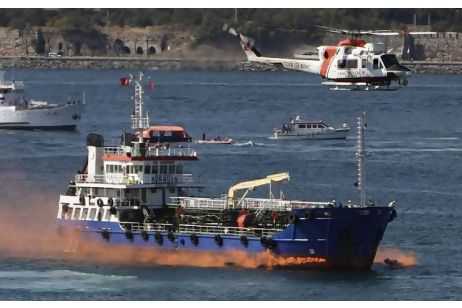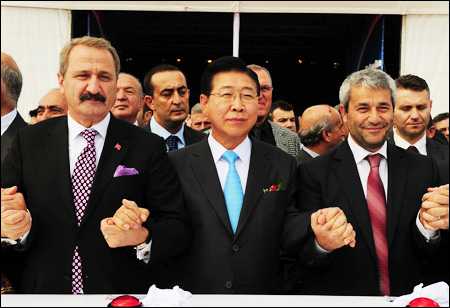Thomas Seibert
Sep 30, 2011

A Turkish Coast Guard helicopter flies over an oil tanker during a National marine pollution emergency response exercises in the Bosphorus yesterday. Osman Orsal / Reuters
A Turkish Coast Guard helicopter flies over an oil tanker during a National marine pollution emergency response exercises in the Bosphorus yesterday. Osman Orsal / Reuters
ISTANBUL // A tanker filled with crude oil crashes into a passenger ferry on the Bosphorus in Istanbul.
Rescue units scramble to get travellers and crew members to safety, while other teams are deployed to fight a growing danger from a massive oil spill on a busy waterway in the middle of a metropolis of 15 million people.
That was the scenario for an emergency exercise staged in Istanbul yesterday.
It was designed to train rescue teams and raise awareness about the dangers of the dense traffic on a narrow strait that is used by 55,000 vessels every year.
Live television pictures showed fire-fighting boats spraying water and rescue teams in dinghies on the Bosphorus next to the tanker Avrasya and the passenger ferry Turgut Ozal.
“An accident will not announce itself it advance. We have to be ready,” Binali Yildirim, Turkey’s transport minister and the official in charge of the exercise, told the state television broadcaster TRT. “We have to keep our cool and know what to do and how.”
In a statement before the exercise, Mr Yildirim’s ministry called the Bosporus a waterway of strategic importance that played a key role in energy transport – but he added that it was “also one of the most dangerous waterways in the world”.
The script for the exercise, the first of its kind, said a rudder failure of the Avrasya would lead to a collision of the vessel with the Turgut Ozal in the waters next to the Maiden’s Tower, a small island at the mouth of the Bosphorus near the Sea of Marmara.
Rescue teams and several helicopters were activated to get survivors off the ships and out of the water, while other boats brought out 3.2 kilometres of floating oil barriers.
About 600 people were scheduled to be involved in the exercise that kept the Bosphorus, one of the busiest waterways in world trade, closed for several hours.
“Nowhere in the world is the risk of an accident as high as it is on the Bosphorus in Istanbul,” Mr Yildirim said this year after a meeting of several cabinet ministers called to discuss ways of preventing an oil spill like the one in the Gulf of Mexico in 2010.
“You have eight critical points with 90-degree bends on a total of 15 nautical miles [28km],” he added.
Turkey said that the Montreux Convention of 1936, a treaty regulating traffic on the Bosphorus and the Dardanelles that defines the straits as international waters, prevents authorities from making a pilot mandatory for ships passing the Bosphorus.
In 97 per cent of 141 accidents recorded on the Bosphorus during a five-year period, the ships involved did not have a pilot, according to the transport ministry.
Veysel Eroglu, the environment minister, said after the meeting with his cabinet colleagues that he was concerned something could go wrong during the passage of one of the nearly 10,000 tankers that use the Bosphorus every year.
“I have nightmares of a tanker accident on the Bosphorus,” Mr Eroglu said.
Presenting the plan for this week’s exercise in a statement, the transport ministry referred to a collision 32 years ago – one of the worst accidents to have happened on the Bosphorus in the recent past.
In November 1979, an oil tanker filled with almost 100,000 tonnes of crude from Libya that was on its way to the Romanian Black Sea coast collided with a Greek freighter near the point where yesterday’s exercise was held.
“In the accident, 51 people died and the tanker ran aground with its stern 200 metres from the shore,” the ministry said. “Later, it broke apart and burned for nearly a month.”
In 1979, about 2.7 million people lived in Istanbul, just a fifth of today’s population.
According to figures from the Turkish government, 143 million tonnes of dangerous goods, including crude oil, natural gas and chemicals, pass through Istanbul on the Bosphorus every year.
Recep Tayyip Erdogan, the Turkish prime minister, has proposed building a new canal west of Istanbul to ease traffic on the Bosphorus. The project, which Mr Erdogan called “important, crazy and wonderful” when he presented it in April, foresees a man-made waterway 50km long, 150m wide and 25m deep.
via Turkey trains for Bosphoros tanker tragedy – The National.




